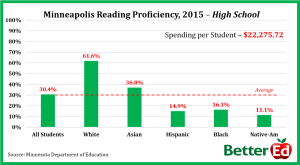Minneapolis is once again illustrating the areas in which the state’s education system is failing. Better-Ed, a non-profit advocacy group for a stronger education system, released a graphic last year depicting the percentage of graduates in a remedial education course at seven different Minneapolis schools. Remedial courses are college courses that students take prior to “regular” courses. Students do not receive credit for remedial courses. Astonishingly, in 2012 64% of North Senior High graduates were in a remedial education course once enrolled in college. Additionally, 45% of Edison Senior High graduates were in remedial courses.

The percentage of students enrolled in remedial education courses doesn’t even begin to depict the issues that Minneapolis public schools are working through. A 2015 report released by the Minnesota Department of Education shows that 77% of black students read below their grade level. Additionally, only 16.1% of black Minneapolis students are proficient in reading, compared 61.6% of their white counterparts. According to Better Ed, there are more black students than white students enrolled in Minneapolis public schools.

Poor educational statistics are affecting the ability of many individuals to graduate. Of those who were in ninth grade in Minneapolis in 2009, more than 50% of them did not graduate from high school, according to a Center for Reinventing Public Education study. Of the cities included in the study, the average graduation rate of students was 75%
Why do graduation rates matter? High school graduates on average make more money, are less likely to engage in criminal activity, are healthier and live longer, and are more likely to aid in job generation. Overall, high school graduates benefit the economy, and have a better economic quality of life. For these reasons, ensuring strong education systems for all creates a better society for all.
Minneapolis’ horrifying education statistics convey that the city has a lot of work to do to foster a stronger education system that works for all individuals, regardless of race, ethnicity, and socio-economic status. To ensure you are kept up to date on Minnesota’s education system, subscribe to Alpha News.











